Book
Aquinas, Original Sin, and the Challenge of Evolution
Cambridge University Press

Spanning six years and five programs, the Creation Project promoted the doctrine of creation in its exegetical, theological, and historical complexity and as it appeared in light of the claims of modern science. The Project sought to make progress in understanding where the conflict between the current state of scientific inquiry and classical theological positions is real and where it is illusory; to promote rigorous and thoughtful research on the foundational theological questions that remain; to revive the full breadth and importance of the doctrine of creation within the church; and to nurture a posture of intellectual hospitality and commitment to interdisciplinary collaboration.
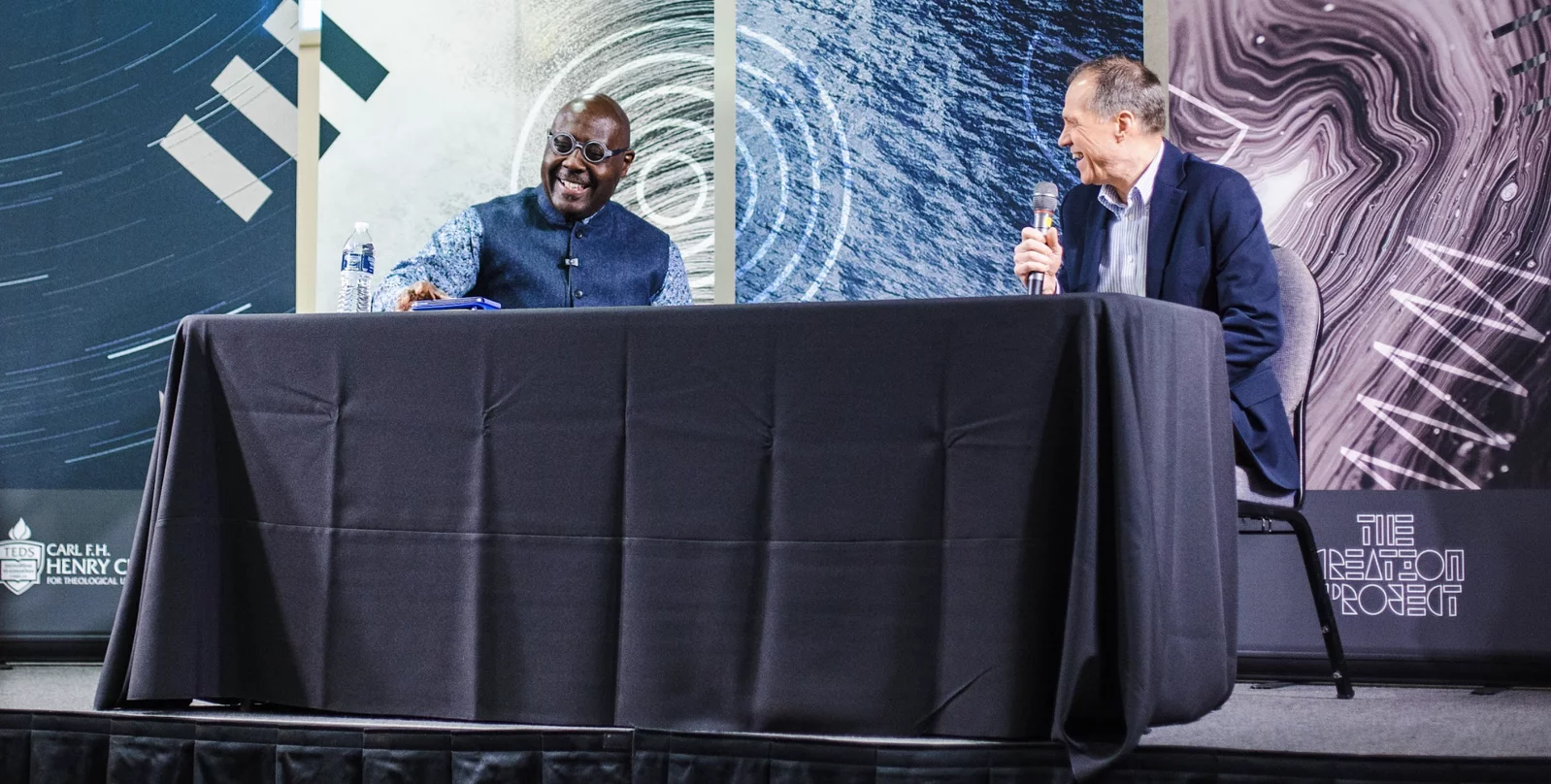
Conversations surrounding science and theology often demonstrate more division and hostility than humility and a shared commitment to truth and understanding. This is especially so when the topic is “creation and evolution.”
Heated public debates and exchanges often heighten this polarization. Some expressions of popular piety among evangelical Christians also contribute to the problem, viewing science as an opponent to faith rather than an ally and interlocutor towards new insights and deeper understanding of reality. Sometimes this mentality is even supported by the perception that orthodox Christian theology (affirming the Bible as definitive and authoritative divine revelation) is fundamentally at odds with the natural sciences.
The consequences are not merely lack of thoughtful choices; increasingly, political and institutional responses are making it difficult for scholarly engagement or humble pastoral guidance. Increased intellectual humility on both sides of the “science and theology” conversation is needed, as well as greater openness to the claims of scientific inquiry and their potential implications in relation to doctrine and ultimate reality.
Within an ecclesial and theological context, much of the confusion is at least in part a result of an inadequate understanding of the doctrine of creation. Too often the “creation vs. evolution” controversy immediately takes center stage and crowds out the very theological convictions that should frame and shape further treatment of the controversial issues.
The Creation Project recognized the need and opportunity for establishing and strengthening this field of inquiry within the evangelical community, both among its thought leaders and the general ecclesial public. We believe that the doctrine of creation provides opportunity for humble and open inquiry and the potential for new insights at the intersection of science and theology.
While some scholars have begun to wrestle with the difficult issues, much work remains. Gathering the thought leaders throughout the evangelical community —pastors, scholars, administrators, and the like—we wanted to change the tone of discourse, research agendas, and public perception within the evangelical community and make progress towards new insights in the doctrine of creation.
In advancing the doctrine of creation at the intersection of theology and modern science, biblical interpretation and empirical investigation, we sought to make progress within the wider evangelical community in four areas:
The fundamental assumption of the Creation Project is that much of today’s antagonism between science and theology stems from an underdeveloped doctrine of creation. To remedy that neglect, therefore, the primary objective in all Creation Project activities is to infuse renewed energy and thought in that doctrine, especially as it relates to the current state of scientific evidence.
The project aims to help stimulate careful and creative scholarly work among both academic and pastoral theologians (as well as budding scholars, ministerial students and other ecclesial leaders) on key issues in the doctrine of creation. It seeks to aid the development of a theological approach to the doctrine of creation that is both faithful to Scripture and classical Christian teaching as well as informed by significant advances in scientific knowledge.
The project proceeds from the conviction that Christian intellectual endeavors should begin with a steadfast confidence in the utter truthfulness of divine revelation as well as a humble and charitable openness to serious study of God’s creation.
The project provides an opportunity to clarify the primary questions that need to be addressed, to test which tensions and contradictions between the disciplines are real and which are merely illusory, to stimulate further work on remaining challenges, and to provide a platform for the dissemination of well-informed evangelical theologies of creation to broader evangelical communities of faith.
Each year, the Creation Project offered residential research fellowships which allowed biblical scholars, theologians and scientists to live on campus and work together to publish articles and books on the doctrine of creation. The Henry Center hosted dozens of fellows from various institutions around the world throughout the duration of the Creation Project.
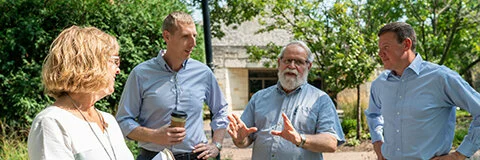
Every Summer, the Creation Project gathered more than 60 evangelical academics from different disciplines, denominations and institutions for a conference where they engaged in honest, humble, and open conversation about the doctrine of creation. Each year had a specific theme, ranging from topics like reading Genesis and theological anthropology to divine action and human personhood.
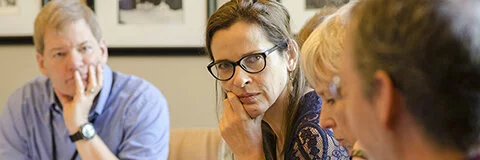
Each year, the Creation Project supported six churches who were interested in engaging with issues related to the doctrine of creation. The program involved forming congregational reading groups, gathering each pastor for a weekend consultation with TEDS faculty, and a sermon series.

The Creation Project’s public lectures and events featured a range of notable biblical scholars and theologians: Al Mohler and Jack Collins debating Scripture’s teaching on the age of the earth; Katherine Sonderegger and Stephen Williams as part of a spring theology conference; Craig Keener on miracles in the New Testament and today. Videos of all of these lectures are still accessible today.
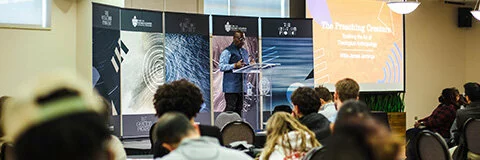
Through our website in general and Sapientia in particular, the Creation Project was able to provide a hub for all lecture videos, published articles, and other resources from the project, which are still accessible today. Throughout the six years, Sapientia published over 200 articles related to the doctrine of creation; they are all still able to be read.

Retrieving Augustine’s Doctrine of Creation: Ancient Wisdom for Current Controversy
The Creation Project sought to recover the meaning and importance of the grand themes of the doctrine of creation, and to articulate that doctrine in a way that was faithful to revealed truth and in open and earnest dialogue with the insights of modern science. At an academic level, we were committed to making progress in understanding about where the conflict between the current state of scientific inquiry and classic theological positions is real and where it is illusory. At a popular level, we were concerned both to revive the importance and breadth of the doctrine of creation beyond the narrow set of questions to which it has too often been reduced and to demonstrate a form of Christian intellectual hospitality that approaches some of the more difficult questions of our age with a posture of humility and in pursuit of greater understanding.
As a ministry of Trinity Evangelical Divinity School, the leadership of the Henry Center is committed to the EFCA Statement of Faith. The theological breadth of various participants of the Creation Project, however, was much wider. Congruent with Kenneth Kantzer’s vision for TEDS, the Henry Center invites speakers who represent the gamut of evangelicalism. In our commitment to engage the most pressing issues and thinkers of our day, we also invited speakers and writers with whom we do not agree in order to grow in our understanding through earnest and respectful dialogue and debate.
Because the Creation Project consisted of five separate programs, there were also different levels of participation and implied agreement between the aims of the Project and those who were participating. In the programs that included an ongoing relationship and support—such as the Henry Fellowship and the Stott Award—greater levels of theological agreement were expected. For example, we required that churches applying for the Stott Award held to a high view of Scripture understood as divine revelation, and our selection committee for the Henry Fellowship prioritized projects that would be most helpful to evangelical churches and the broader evangelical community. In other contexts (e.g., someone writing a piece for our online periodical, Sapientia) a broader range of theological and scientific perspectives were represented.
The first question that many people want to know about the Creation Project is our position on a specific set of scientific issues (e.g., the age of the earth, common descent). The Creation Project was, at its core, a theological project. Its context was the church (not the laboratory), its leadership was trained in the theological disciplines (not primarily the natural sciences), and its expertise was in the interpretation of Scripture (not the analysis of empirical evidence).
With respect to specific issues in science, we had participants who represented the broad range of positions within evangelicalism. Stated positively, grounded in the Scriptures and the church’s historic witness, we were (1) promoting a form of rigorous, traditioned, and biblically grounded orthodoxy that also demonstrated humility and openness to the claims of science by (2) growing in our understanding of the natural sciences so that we could be more informed about the state of scientific inquiry in a range of disciplines, and thus (3) more able to discern where the state of scientific inquiry was in genuine conflict with Scripture and the classic teaching of the church and where such conflict was only illusory.
No. The Creation Project itself did not advocate for any specific position on the age of the earth. Our primary concern was to recover the grand themes of the doctrine of creation, demonstrated in both Scripture and the tradition. Our advisory council, our speaker lineup, and our various participants made up a group of Christians from a spectrum of theological and scientific positions—young earth creationists, progressive creationists, and evolutionary creationists. As noted above (Question 2), the level of implied theological or scientific agreement varied based on the differing programs that made up the Creation Project.
No. The Creation Project did not advocate for any specific position on the theory of evolution. There are certain forms of evolution that are incongruent with orthodox Christianity, evident by their presuppositions and reasoned conclusions, but that does not necessarily mean that all forms of evolutionary theory and the Christian faith are inherently incompatible. An important part of the Creation Project was to discern where the apparent conflict between current scientific theories and the received theological tradition was real and where it was illusory, and an important part of that task was growing in our understanding of evolution, both its assumptions and its entailments.
Moreover, like our position on the age of the earth, our advisory council, our speaker lineup, and our various participants made up a group of Christians from a spectrum of theological and scientific positions—young earth creationists, progressive creationists, and evolutionary creationists. As noted above (Question 2), the level of implied theological or scientific agreement varied based on the differing programs that made up the Creation Project.
Like our positions on the age of the earth (Question 5) and evolution (Question 6), our advisory council, our speaker lineup, and our various participants made up a group of Christians from a spectrum of theological and scientific positions—young earth creationists, progressive creationists, and evolutionary creationists. As noted above (Question 2), the level of implied theological or scientific agreement varied based on the differing programs that made up the Creation Project.
As noted above, the staff of the Henry Center unreservedly affirm the EFCA statement, which includes the affirmation of a historical Adam.
We also understood that the issues related to the historicity of Adam and Eve are some of the most pressing issues that need to be addressed. Many important theological issues are tied into the question of the historicity of Adam and Eve, from what it means to be human to how we are to understand the world and our own nature as fallen, among others. It is also a question of both biblical fidelity and church unity. Accordingly, we were taking this question with the utmost seriousness as we sought to provide guidance to the church on the bounds of orthodoxy and in the spirit of Christian charity.
As a ministry of Trinity Evangelical Divinity School, the leadership of the Henry Center wholeheartedly endorses the Evangelical Free Church of America’s Statement of Faith. (Trinity is officially affiliated with the EFCA.) While our leadership holds to the doctrinal positions of the EFCA Statement of Faith, this does not mean that we only include voices representative of our position in the various Henry Center sponsored events. This is consistent with Kenneth Kantzer’s vision of Trinity, not only that the divinity school would represent the best of the full gamut of evangelicalism, but also that we would be able to listen to and engage with the pressing challenges of our day and voices other than our own.
The Creation Project was an initiative of the Henry Center. It therefore continued the Center’s purpose of advancing wisdom-oriented theological reflection for the glory of God, the edification of the church, and the witness of the world. See the Henry Center “about page” to learn more about the Center. In short, the Henry Center is a ministry of the TEDS faculty, supporting initiatives that are collaborative in nature and addressing the pressing needs of the church. We have supported a wide range of projects, representing a breadth of theological and ecclesial traditions. The Creation Project came out of that same ethos. We aspire to bring together the full body of Christ, from a range of positions—including not only differing positions, but also denominations, institutions, and disciplines—to address some of the most important questions of our day.
The Henry Center is a ministry of TEDS, created to promote evangelical collaboration across denominations, institutions, and disciplines, and to address the pressing questions facing the church. As such, the Henry Center is closely related to Trinity and especially its faculty. The center is directed by Tom McCall, it has funded and administered faculty projects for Deborah Colwill, Don Carson, Peter Cha, Scott Manetsch, Robert Priest, Tite Tiénou, and Kevin Vanhoozer. Several faculty sit on the advisory board, and many others have participated in the various projects and initiatives.
If by “Trinity,” one primarily has in mind a degree program, responsible for training students and teaching classes, then the Henry Center has less prominence in the daily curricular and student life of Trinity’s campus. The Henry Center is more closely tied to the research and writing aspect of faculty responsibilities, and it is founded especially in an effort to overcome the fragmentation and specialization happening in scholarship as well as between the academy and the church. The Henry Center is therefore primarily focused on building partnerships between institutions and has limited regular involvement in the curricular programs of Trinity. The same would also be true with regard to the Creation Project.
JTF’s relationship to Trinity was that of grantor.
The John Templeton Foundation is a foundation that awarded and funded the project that we (grantee) submitted, a $4.2 million, three-year, five-program initiative on the doctrine of creation. The next question will address whether we have been required to shape our theology around any particular scientific theory. On the nature of our relationship to Templeton, however, it might be good to add a word about foundation work in general, which is common part of university life, but may be somewhat unfamiliar to many people in the church.
As a non-profit organization, institutions like Trinity are often looking for ways to fund new initiatives that are not part of standard operation, projects like curriculum redesigns, research study leaves, piloting new and experimental projects. Sometimes these projects can be funded by wealthy private donors or large capital campaigns. Another major means of funding is that of foundations. Foundations are non-profit organizations that provide funding to individuals and organizations, and they often fund around a set of core initiatives. The Creation Project was funded by a grant from JTF, but Trinity has many other grant projects currently under way. For example, Trinity currently receives funding from the Kern Family Foundation for projects related to faith and work, as well as two different projects from the Lilly Foundation.
When applying for any grant, Trinity always has to ask whether the granting foundation aligns with our vision and mission, specifically in the area of funding. (Of course, the same question is often involved even with private donors who dictate how their gift is spent.) We do not necessarily align with everything that the Kern Family funds or that of Lilly. But the question is whether our own needs and interests align with theirs in a particular area. The Creation Project has raised more questions than some of the others because Templeton has been more publicly scrutinized and the issues at stake are more divisive, but the question of institutional vision and mission is not different.
When applying for the Templeton grant, the leadership of the Henry Center and Trinity Evangelical Divinity School carefully considered the fit between Trinity and JTF, and we believe that there is sufficient overlap in the organizations to make this grant rewarding for both. Our grant is funded in the area entitled “Science and the Big Questions: Philosophy and Theology.”
The simple answer to this question is no. Templeton funds a wide range of projects; some are led by atheists, some are led by adherents of other religions, and some are led by Christians who believe in creation.
Some of this confusion likely stems from misunderstanding about the nature of foundation work. Because Templeton promotes projects that either assume or promote evolution does not mean that the foundation is chiefly dedicated to the advancement of evolutionary theory nor that every Templeton-funded project is about evolution. Considering that evolution is a dominant theory in modern science and the impetus for much of the current discussion and controversy at the intersection of theology and science, issues related to evolution will be consistently near the surface. However, evolution is not the primary focus of the Creation Project, nor is the nature of its compatibility with orthodox Christianity predetermined.
Our actual funding area is called “Science and the Big Questions: Philosophy and Theology,” which funds projects that demonstrate potential in making progress on the “enduring Big Questions.” Nearly the entirety of our grant proposal is publicly visible on our website, either in the Creation Project landing page (objectives, perceived social context, and theme topics) or the individual programs (Henry Resident Fellowship, Stott Pastoral Award, Dabar Conference, Sapientia, and Public Lectures and Events). Evident throughout is commitment to developing the doctrine of creation and doing so with a posture of intellectual hospitality toward scientific inquiry. Moreover, we now have more than three year’s body of work, accessible both on our resource page and on Sapientia, which demonstrates the ways in which we’re engaging scientific questions and theories in conjunction with theology.
As stated above, the Henry Center has historically supported projects that are collaborative in nature and address the pressing needs of the church. As a project on the doctrine of creation, we were eager to partner with other organizations and individuals who are invested in this topic and who share the same commitment to truth, intellectual hospitality, collaboration, and Christian charity in our shared gospel labors. Accordingly, while there may be differences of beliefs and of disciplinary orientation on an array of issues, we developed good relationships with many other Christian organizations addressing issues related to creation and the natural sciences, but we had no formal relationship with any of them. Members of these organizations participated in our summer conference, public events, and wrote for our online periodical, Sapientia. Moreover, as one of the few theological projects involved in the conversation, we hoped to contribute to the conversation by raising new biblical and theological concerns and questions to an already lively and important discussion.
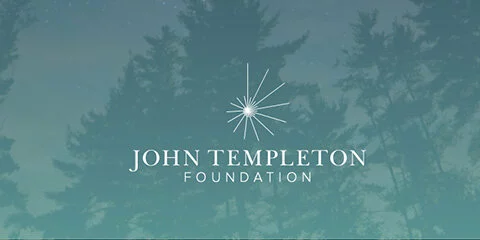
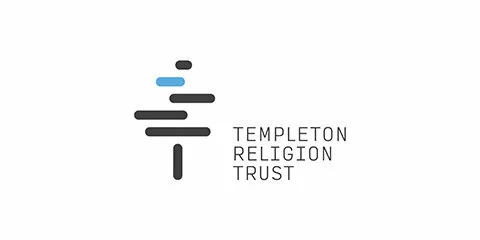
This project was made possible through the support of two generous grants from the Templeton Religion Trust and the John Templeton Foundation. From 2016–19, the Creation Project was funded by a $3.4 million grant from the Templeton Religion Trust; from 2019–22, the Creation Project was funded by a $4.2 million grant from the John Templeton Foundation.
The opinions expressed throughout this project did not necessarily reflect the views of the Templeton Religion Trust or the John Templeton Foundation.